The Institute for Policy Integrity produces a variety of publications. Our research reports develop in-depth research on our core issues, while our policy briefs and issue briefs provide focused analysis on more timely or particular topics. Our academic articles and working papers offer original scholarly research and analysis from established experts as well as fresh new voices.
Latest Publications
-
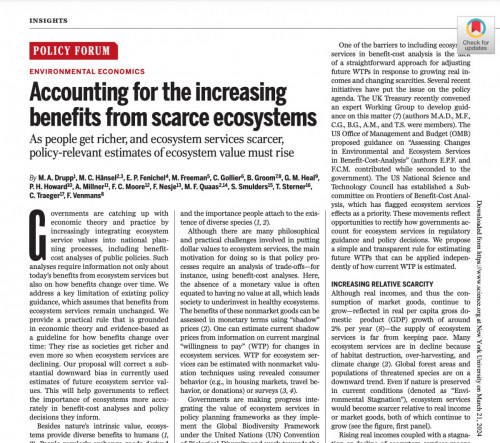
Accounting for the Increasing Benefits From Scarce Ecosystems
As people get richer, and ecosystem services scarcer, policy-relevant estimates of ecosystem value must rise
Governments are catching up with economic theory and practice by increasingly integrating ecosystem service values into national planning processes, including benefit-cost analyses of public policies. Such analyses require information not only about today’s benefits from ecosystem services but also on how benefits change over time. We address a key limitation of existing policy guidance, which assumes that benefits from ecosystem services remain unchanged. We provide a practical rule that is grounded in economic theory and evidence-based as a guideline for how benefits change over time: They rise as societies get richer and even more so when ecosystem services are declining. Our proposal will correct a substantial downward bias in currently used estimates of future ecosystem service values.
-
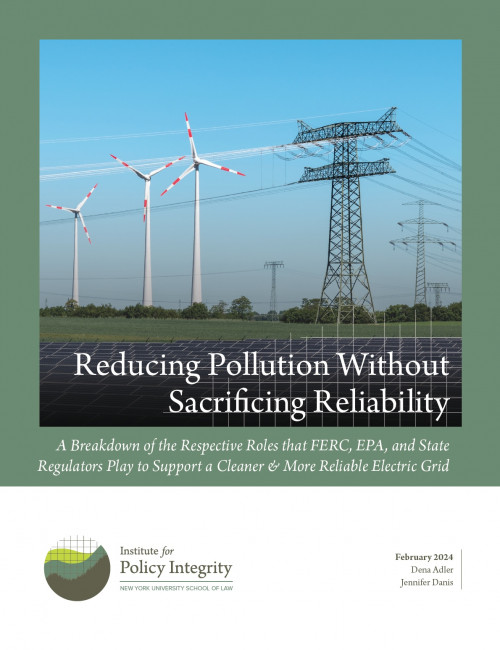
Reducing Pollution Without Sacrificing Reliability
A Breakdown of the Respective Roles that FERC, EPA, and State Regulators Play to Support a Cleaner & More Reliable Electric Grid
Multiple federal and state regulators must coordinate their efforts to ensure electric grid reliability, particularly during a period of major transition, and it is important to understand what role each of them plays. This report reviews the respective roles of FERC, RTOs/ISOs, other transmission operators, state public utility commissions, and state environmental regulators. EPA’s duty to reduce GHG emissions that endanger public health and FERC’s duty to steward grid reliability will require them to coordinate each other’s respective expertise as they work with RTOs/ISOs, state regulators, and utilities to implement EPA rules.
-
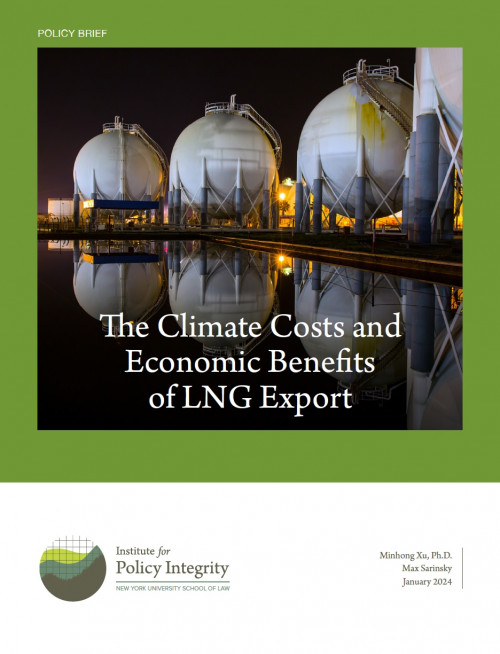
The Climate Costs and Economic Benefits of LNG Export
Gas provides nearly a quarter of the world’s total energy supply. As part of that supply chain, gas is shipped between continents in the form of liquefied natural gas (LNG). The United States is now the world’s largest LNG exporter following a surge in gas exports since 2016, but these exports have generated controversy due to their climate effects.This policy brief provides an analysis to support an effort to balance the full range of impacts from LNG exports. Using DOE’s own published studies, we compare the climate cost per unit of LNG export to the economic benefit (measured using consumer welfare). We find that climate costs likely exceed economic benefits. While the precise difference depends on several factors, gross climate damages greatly exceed economic benefits under all scenarios evaluated. These findings provide useful insights as DOE prepares to re-evaluate the LNG export program.
-
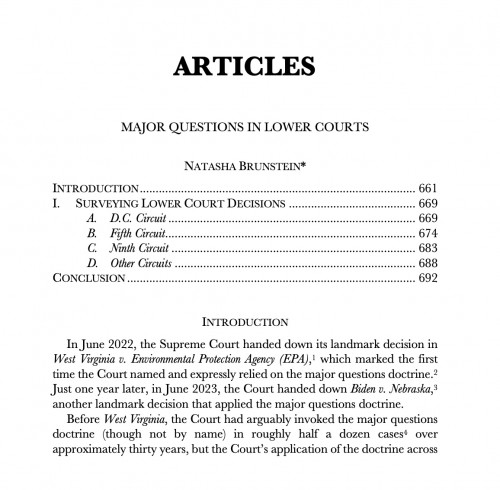
Major Questions in Lower Courts
Published in the Administrative Law Review
In June 2022, the Supreme Court handed down its landmark decision in West Virginia v. Environmental Protection Agency (EPA), which marked the first time the Court named and expressly relied on the major questions doctrine. This Article surveys how lower federal courts have interpreted West Virginia and applied the major questions doctrine. There is no one major questions doctrine in the lower courts. Judges have taken vastly different approaches to defining and applying the doctrine both within and across circuits. These differences illustrate that many judges may view the doctrine as a little more than a grab bag of factors, which they seem to be choosing from at their discretion. Lower court judges do not appear to be constrained in how they apply the doctrine. In a majority of cases concerning Biden Administration agency actions and executive orders, judges applied the doctrine to reach outcomes that aligned with the political party of their appointing President.
-
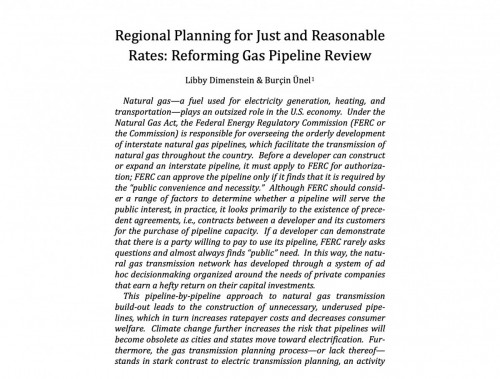
Regional Planning for Just and Reasonable Rates: Reforming Gas Pipeline Review
Published in the Columbia Journal of Environmental Law
Natural gas plays an outsized role in the U.S. economy. Under the Natural Gas Act, the Federal Energy Regulatory Commission (FERC or the Commission) is responsible for overseeing the orderly development of interstate natural gas pipelines, which facilitate the transmission of natural gas throughout the country. FERC can approve the pipeline only if it finds that it is required by the “public convenience and necessity.” Although FERC should consider a range of factors to determine whether a pipeline will serve the public interest, in practice, it looks primarily to the contracts between a developer and its customers for the purchase of pipeline capacity. If a developer can demonstrate that there is a party willing to pay to use its pipeline, FERC rarely asks questions and almost always finds “public” need. This pipeline-by-pipeline approach to natural gas transmission build-out leads to the construction of unnecessary, underused pipelines, which in turn increases ratepayer costs and decreases consumer welfare. Climate change further increases the risk that pipelines will become obsolete as cities and states move toward electrification. Relying on economic theory, legal history, and policy analysis, we make the case in this paper—pulished in the Columbia Journal of Environmental Law— for FERC’s adoption of regional gas transmission planning.
